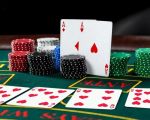
The Importance of Strategy in High Stakes Poker
When you're playing poker at the highest stakes, it’s not just about the cards you’re dealt, it’s about the strategy you employ to maximize your chances of winning. High stakes games are intense, fast-paced, and require an in-depth understanding of poker psychology, mathematics, and bluffing. In this article, I’ll walk you through some of the best poker strategies for high stakes games that I’ve personally used to elevate my gameplay. Whether you're a novice or an experienced player, these tips will help you hone your skills and potentially boost your bankroll.
Understanding the Dynamics of High Stakes Poker
Before diving into strategies, it’s essential to understand the environment of high stakes poker. These games are filled with players who are either seasoned professionals or experienced amateurs with deep pockets. The competition is fierce, and the pressure can be overwhelming. When the blinds are high and the pots are enormous, the decisions you make can either make or break you. That’s why understanding the game at a deeper level is crucial.
In high stakes games, you can’t just rely on your hand strength alone. You must read the table, observe your opponents’ behavior, and adjust your play accordingly. This game is about people as much as it is about cards. Having a solid grasp of poker psychology is often the deciding factor between winning and losing.
Key Strategies to Succeed in High Stakes Poker
1. Play Tight, But Know When to Loosen Up
In the early stages of a high stakes game, I always start with a tight strategy. I only play premium hands and fold the rest. This is critical because the dynamics at these stakes often encourage aggressive play, and you don’t want to get caught in unnecessary pots. Playing tight doesn’t mean being overly passive; rather, it means being selective about the hands you play.
However, as the game progresses, you’ll need to loosen up a bit and mix in some well-timed bluffs. The ability to adjust your play style based on the flow of the game is a key skill. Knowing when to loosen up and when to tighten up is essential in staying unpredictable, which can keep your opponents on edge.
2. Pay Close Attention to Your Opponents
In high stakes poker, reading your opponents is everything. I’ve found that one of the most effective strategies is paying close attention to your opponents' habits and tendencies. Some players are tight, only playing strong hands, while others might be loose and willing to bluff frequently. By observing their actions, betting patterns, and body language, you can gain valuable insights into their playing styles.
Over time, you can adjust your strategy to exploit their weaknesses. For example, if you notice a player always bets aggressively with mediocre hands, you might want to call more frequently with strong hands and let them bluff themselves out of the game. On the other hand, if a player is overly cautious, you can exploit them by raising frequently to steal the blinds or control the pot.
3. Master the Art of Bluffing
Bluffing is an essential part of poker, but in high stakes games, it needs to be executed with precision. It’s not enough to bluff just because you’re feeling daring; it requires strategy, timing, and an understanding of the table dynamics. I’ve learned that the best bluffs are those that come in the right situations—when your opponents are most likely to fold, or when you can convince them that you have a stronger hand than you do.
Bluffing is also about building your table image. If your opponents think you only bet with strong hands, a well-timed bluff can be incredibly effective. The key is to balance your bluffs with your strong hands. If you’re always bluffing, your opponents will catch on, and if you never bluff, you’ll miss out on opportunities to take pots away from your opponents.
4. Don’t Be Afraid to Fold
One of the most valuable lessons I’ve learned is that folding can sometimes be the best decision. In high stakes poker, the pots can be massive, but you don’t have to win every hand. There will be times when you simply have to let go of a hand, even if you’ve invested a lot into it. The key is not to let your emotions take over. In fact, some of my biggest wins have come from folding hands that seemed promising but were ultimately losing propositions.
Don’t get too attached to your cards. A good player knows when to walk away from a hand, and often, that’s what separates the amateurs from the professionals.
Advanced Tactics for High Stakes Poker
5. The Importance of Position
Position is a critical factor in high stakes poker. The later you act in a hand, the more information you have about the other players' actions. This gives you an edge because you can make more informed decisions. I always try to take advantage of my position by playing more aggressively when I'm in a late position and being more conservative in an early position.
Being in a late position allows me to control the flow of the game. I can raise when everyone else folds, or I can call with a wider range of hands. Position is one of the most powerful tools in poker, and mastering it can lead to consistent success in high stakes games.
6. Bankroll Management
It’s essential to have solid bankroll management when playing high stakes poker. The risks are much higher, and losing large sums of money can happen quickly. I make sure to never risk more than a small percentage of my total bankroll on any single game. This ensures that I can weather any inevitable downswings without going broke.
Having a clear strategy for managing your bankroll allows you to stay in the game longer and focus on improving your skills. Remember, the goal is not just to win a big hand; it’s to stay in the game for the long run and maximize your winnings over time.
7. Mental Toughness and Patience
High stakes poker is mentally exhausting. You’ll encounter many ups and downs, and it’s easy to get frustrated or let emotions cloud your judgment. One of the most important strategies I use is to stay calm, even when things aren’t going my way. It’s vital to maintain mental toughness and patience in these games. The ability to stay focused and composed, regardless of whether you’re on a winning streak or a losing one, is crucial for long-term success.
Developing a strong mental game takes time, but it’s one of the most rewarding aspects of becoming a successful poker player.
Real-Life Examples from High Stakes Tables
Let me share a quick story from one of my most memorable high stakes poker games. I was playing in a tournament where the blinds were incredibly high, and the pressure was mounting. I had a solid hand, but my opponent had been playing aggressively. I knew he was bluffing, but instead of immediately calling, I took my time, watched his body language, and waited for the right moment. I eventually made a big raise, and he folded, giving me the pot.
This moment taught me the value of patience, observation, and timing. It was a huge win, not just in terms of the money, but in terms of mastering the art of high stakes poker strategy.








